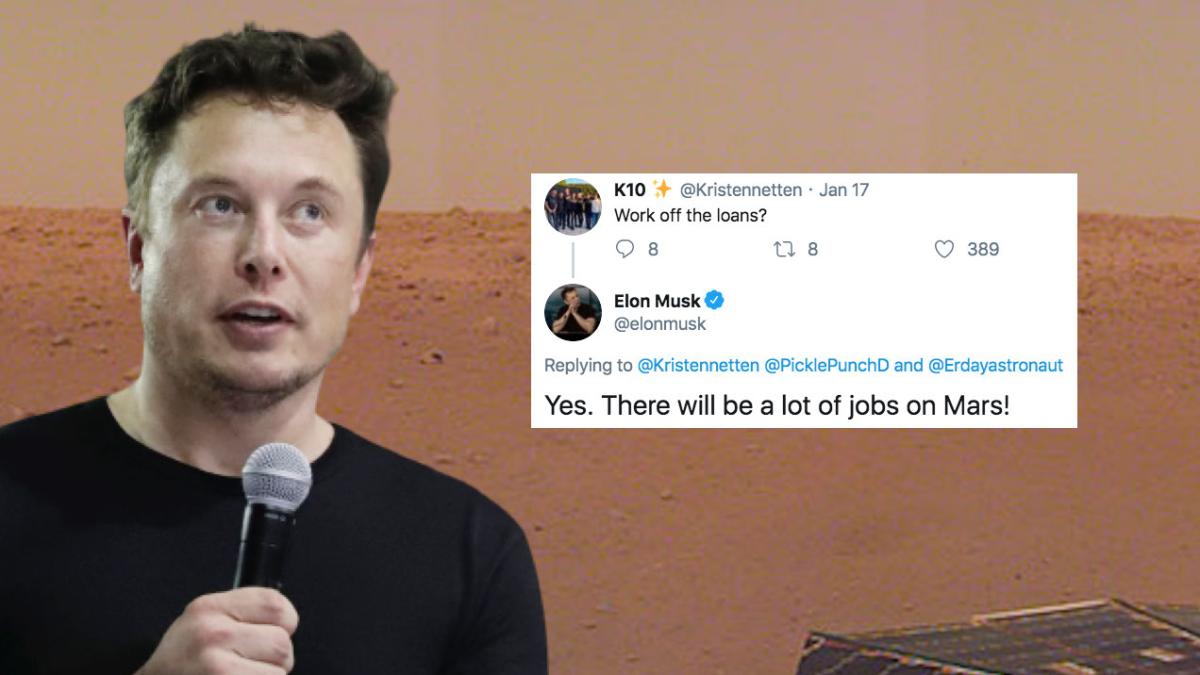
Fans of Elon Musk see the man as a genuine visionary. It brings me no joy to say they have a point.
The billionaire entrepreneur’s companies have revolutionised electric vehicles, the digital economy, and straight-to-consumer flamethrowers. But Musk’s overarching goal has long been permanent human settlement in space: he wants to be the first person to colonise Mars, giving humanity a potential lifeline amid Earth’s uncertain future. It’s just a shame that his forward-thinking plan borrows so heavily from the past.
[jwplayer zEQ0BwRc]
On Friday, Musk offered key insights into who will be eligible to be among the first 100,000 “explorers” to live in a proposed SpaceX colony. Musk said he wanted to ensure “anyone can go if they want, with loans available for those who don’t have money.” When pressed on whether that means workers will “work off the loans” on the harsh Martian surface, Musk said yes.
“There will be lots of jobs on Mars!”, he said.
Needs to be such that anyone can go if they want, with loans available for those who don’t have money
— Elon Musk (@elonmusk) January 17, 2020
Yes. There will be a lot of jobs on Mars!
— Elon Musk (@elonmusk) January 17, 2020
What Musk is proposing here is a futuristic spin on indentured servitude.
In the late 1600s, before the African slave trade really cranked up, impoverished Europeans were offered the opportunity to sail the Atlantic and start a new life in the colony of Virginia. The cost: years of labour for their “sponsor”, plus what The Atlantic characterised as “whippings, split tongues, sliced ears, and extra years of service.” Coaxing workers to Mars with the promise of a revolutionary role in human history is a bold pitch, but it’s hard to ignore the historic precedent. (For the record, there is no suggestion Musk or anyone at SpaceX has been, or will be, responsible for such dire treatment.)
Then there are the unknowns. How long would it take a labourer to work off the price of their ticket? The Martian atmosphere would deny workers the privilege of even gasping for air. What extraordinary feats would be required of workers signed on to Musk’s loan system? When a settler dies with work unfinished – and there will be deaths – will their debts pass on to their children? These are not unfair questions, considering the battering sustained by terrestrial labour movements in recent decades. Corporate space feudalism, baby!
SpaceX hasn’t even built the orbital prototypes necessary for its grand plans on Mars, and Musk’s plans to hurl anyone at the next rock from the Sun remain psychedelically optimistic (there is also the overwhelming argument that billionaires like Musk should divert their funds to avoiding a climate catastrophe on the planet we already live on). Still, the fact Musk considers indentured servitude a viable option, even in the middle of a social media spit-balling session, suggests any SpaceX effort to settle on Mars would only emulate the struggle of capital and labour besieging boring old Earth.
Writer Caroline Haskins posits that even the language of space ‘colonisation’ connotes an underclass. Considering the racial inequality present in all levels of society, “Not nearly enough work has been done here on Earth to ensure that these structural inequalities wouldn’t carry through,” Haskins wrote for The Outline.
I’m inclined to agree. Imagine the future divide between fee-paying travellers and those who plan to work off their one-way trip. In what world would those sides break evenly by race, sex, and class?
“When we think about humanity’s potential to exist on other planets, it’s important to consider who won’t have access to space, in part due to a total lack of concern over these issues by people who are able to access it,” Haskins continued.
Haskins cites astronomer Lucianne Walkowicz, who, in 2018, convened the Decolonizing Mars conference to address that precise issue. “Many people are used to hearing about “colonizing Mars” to talk about humanity living in space,” the conference website reads. “Here, we examine how using a colonialist framework in space reproduces past harm from humanity’s history on Earth.”
It’s not only writers and academics who caution against old-school Earth thinking.
Back in 2013, Eric Anderson, head of space tourism firm Space Adventures, said it was “inevitable” that pre-existing conflicts will influence any off-world settlement. “I think that history repeats itself, and all the same things that happened in our history over the last thousand years will happen in one form or another in the next thousand years,” he told The Atlantic.
To make interplanetary settlement remotely viable, SpaceX and its competitors will need to whittle down the price of space travel. “You can’t create a self-sustaining civilization if the ticket price is $10 billion per person,” Musk himself said in 2016. But his new solution – attracting pioneers at the likely cost of their lives – isn’t so new at all. It’s as far from “visionary” as you can get.







